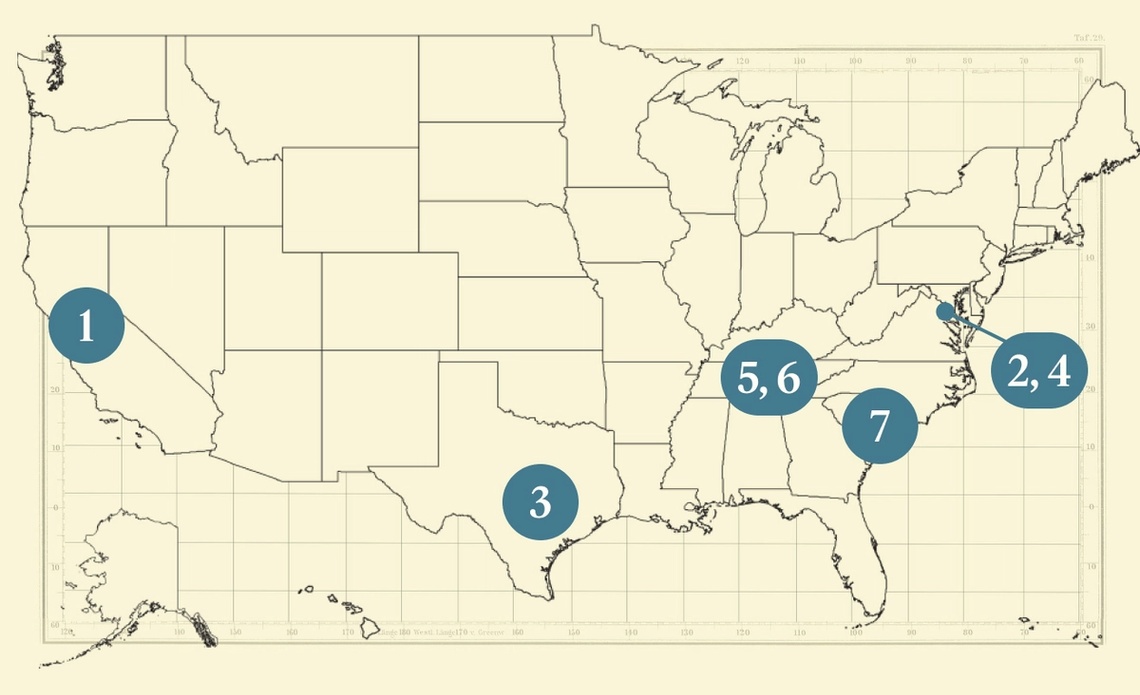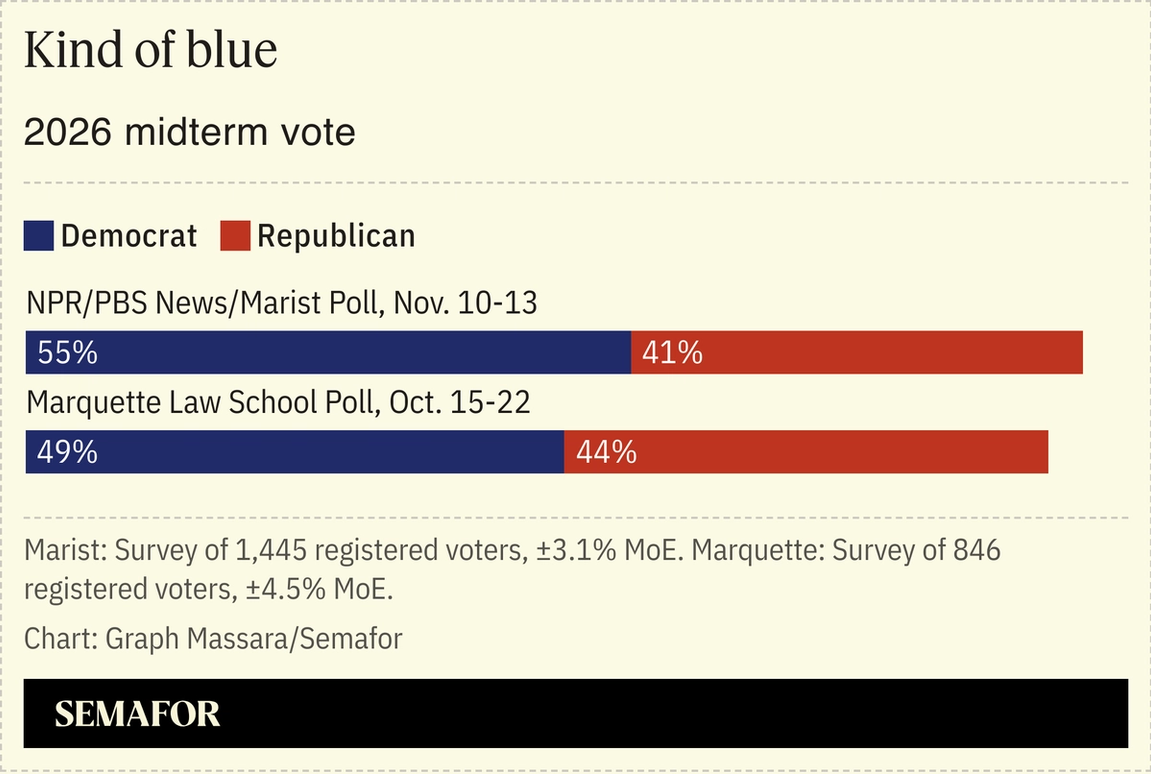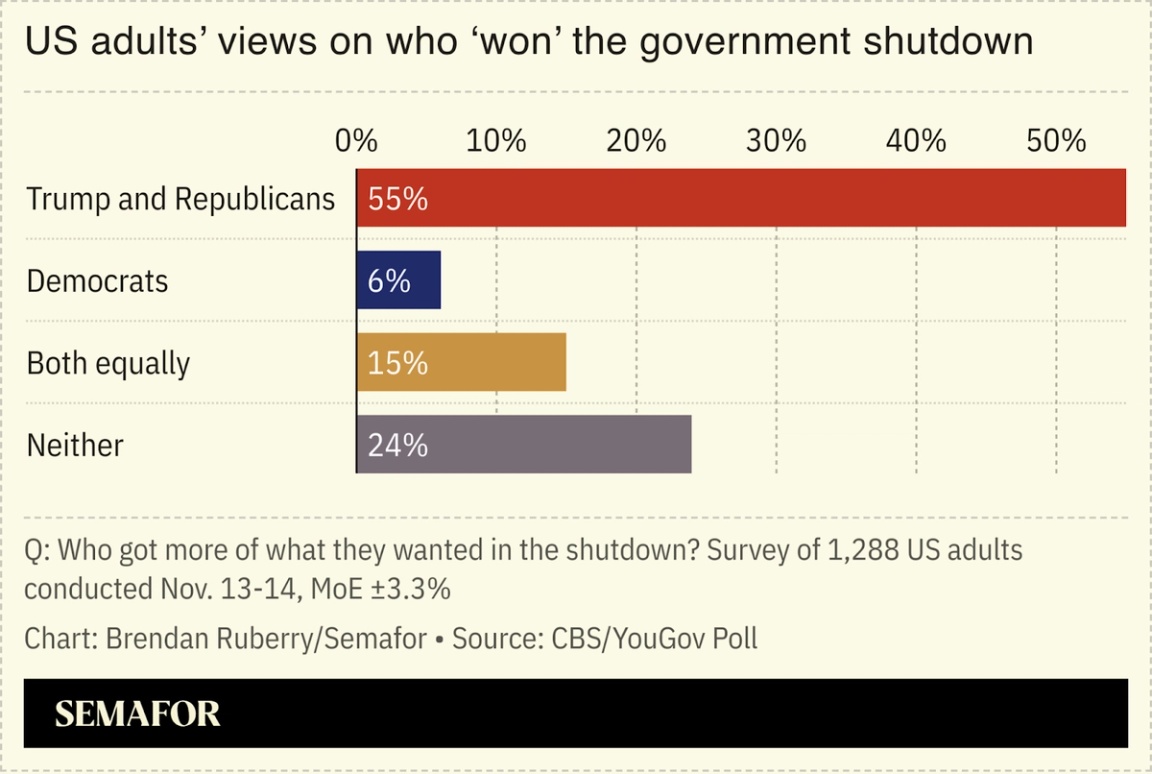| | In today’s edition: very early 2028 talk. ͏ ͏ ͏ ͏ ͏ ͏ |
| |   Washington Washington |   Austin Austin |   Nashville Nashville |
 | Americana |  |
| |
|
 - Democrats play Risk
- Kind of blue
- Running on empty
- A base shut down
- Mixed-up files
- GOP affordability message
- Nancy ‘Karen’ Mace
|
|
Democrats start falling for risk-takers |
| |  | David Weigel |
| |
 Annabelle Gordon/Reuters Annabelle Gordon/ReutersHere’s a telling question: Where did the Chris Van Hollen-for-leader talk come from? It started with the Maryland Democratic senator’s trip to El Salvador to meet with Kilmar Ábrego García, wrongly deported there by the Trump administration, while other Democrats worried about the optics. It continued with Van Hollen’s invitation to an Iowa fundraiser, which charged up speculation about a presidential bid, despite his insistence that he wasn’t interested. Then, after Democrats struck a deal to end the shutdown — a move opposed by Van Hollen, who represents hundreds of thousands of federal workers — progressive activists circulated a memo explaining why he should lead their party in the Senate. Van Hollen denied interest in that job, too. But when he joined the liberal group Patriotic Millionaires for a rally this week, the activists introduced him as “somebody who should run for president.” “I do want to play a very big role in terms of the future of the Democratic Party,” Van Hollen said. That’s a booming industry. In the aftermath of the shutdown and the party’s successful off-year elections, the Democrats who’ve taken the biggest risks have seen the biggest benefits. In the very early 2028 conversation, the one Van Hollen insists he isn’t part of, this has meant a boomlet for California Gov. Gavin Newsom and a surge for Rep. Ro Khanna, D-Calif. Newsom chose to push forward on a gerrymandering referendum that passed by 29 points. Khanna teamed up with Rep. Thomas Massie, R-Ky., and became the Democratic face of a victory on the Jeffrey Epstein files. Both men ended up routing the Trump White House. It was a win, said Khanna, over the “Epstein Class,” a term he picked up when he noticed how angry podcasters were getting about what the late sex trafficker and his clients had gotten away with. |
|
Polls find Democratic advantage on generic midterm ballot |
 Most pollsters underestimated Democratic strength in this month’s off-year elections. Some modeled the wrong electorate, underestimating Democratic turnout and missing Republican losses with nonwhite Trump voters. That’s not happening anymore. Both of these pollsters found a Democratic base that’s not happy with its party; in Marquette’s poll, just two-thirds of Democrats approve of their party’s members of Congress. But Democrats have an enthusiasm advantage in both polls. Republicans have even grown more skeptical of mid-decade redistricting, with just 30% of them in favor, down from 38% before California Democrats passed their own gerrymander. |
|
The longest special election and its mystery seat |
 Antranik Tavitian/Reuters Antranik Tavitian/ReutersJust one day after Texas Gov. Greg Abbott set a Jan. 31 date for a special congressional election in a Houston district that his new map would eliminate next year, a mostly-Republican judicial panel blocked that new map. The ruling landed with real force, raising the possibility that Abbott’s Trump-boosted redistricting can’t go into effect next year unless the Supreme Court quickly reverses the lower court. “Our filing deadline ends Dec. 8. They did not adjust that,” Rep. Julie Johnson, D-Texas, told the Texas Tribune. “We have just a few more days.” Johnson was among the Democrats whose seat was erased after Assistant Attorney General Harmeet Dhillon sent a letter to Abbott, warning that the state’s previous Republican-drawn map was an “unconstitutional racial gerrymander.” That was crucial to the case against the map, which the court struck down because Republicans redrew it with race in mind, reducing the number of majority-minority seats Democrats could win. In Houston, the new map would have forced the winner of the Jan. 31 runoff into a race against 78-year-old Rep. Al Green. Harris County Attorney Christian Menefee and former Houston City Council member Amanda Edwards, both millennials, had protested the long delay in the special election, which was called after the late Sylvester Turner died in March. If the new GOP map ends up going back into force, the winner of the special will have just weeks to beat Green. |
|
Democratic partisans wanted a different shutdown ending |
 Few Democrats thought they could “win” the government shutdown. Yet some got bolder as it stretched on and as the White House committed itself to cutting food aid, an unpopular position that the president hadn’t run on. But Democrats agreed to fund the government for a promise of a separate vote on health insurance subsidies, and their base was not pleased. Fifty-five percent of Democratic voters said their party compromised “too much” to end the shutdown, compared with 17% of Republicans who said that about their party. Just 27% of Democrats said they were “relieved” when the shutdown ended, compared with 50% of Republicans. |
|
Democrats’ swing seat ‘Epstein’ play |
 MediumBuying/X MediumBuying/XDemocrats keep getting involved in the race for Tennessee’s 7th Congressional District, a safely gerrymandered Republican seat carved out of Nashville that Trump won by 22 points last year. A new ad from a PAC funded by progressive donor collectives, one that usually spends in more competitive districts, shows how Democratic admakers are trying to sync up the Epstein story with their usual populist message. The ad features a puppet version of GOP candidate Matt Van Epps locking a safe containing “Epstein files,” then dancing to a song about how a “hedge fund puppet for the billionaire elite” will cover up anything in order to pass regressive tax cuts. Some Democratic strategists believe that more culturally conservative voters can be won over without giving any ground on social issues, once those voters are convinced that wealthy elite Republicans are using those issues to distract them. |
|
Careful cost-of-living messaging from Nashville Republican |
 Matt Van Epps for Congress/YouTube Matt Van Epps for Congress/YouTubeVan Epps won his primary with a boost from the president, and his five-second YouTube preroll ads — targeted to conservatives — simply point out that he has Trump’s support. His TV spots are pitched to a larger audience and don’t mention his party affiliation at all. Straight to camera, Van Epps (who briefly served in the governor’s office) says he’s sick of “career politicians,” vowing to march into DC to “bring down prices” and “lower health care costs for working families.” That’s in sync with House Republicans, who worry that their tax-and-spending bill has been tough to sell and have recently rebranded it as a “working families tax cut” package. |
|
 JP/YouTube JP/YouTubeFormer DNC chair Jaime Harrison signed on to work with the Democratic group behind this ad. There is no Democratic nominee for governor of South Carolina yet, but the PAC, which formed to help likeminded candidates in red, rural states and districts, is spending against Republican Rep. Nancy Mace anyway. Its new digital ad focuses on her confrontation with Charleston airport security, though some of its criticism hits on issues that mean more to liberals than Republican primary voters, like her use of an anti-trans slur. Other jabs in the ad are more multipurpose, like the closing insult: “She’s not just a Nancy, she’s a Karen.” |
|
 In Washington, economic power no longer follows party lines. The old frameworks — left vs. right, House vs. Senate, Republican vs. Democrat — no longer fully explain how economic power moves in the Capitol. Today’s influence moves through a wide network, from traditional power brokers to ideological outliers, dealmakers, and policy entrepreneurs. Join us December 10 for exclusive one-on-one conversations with leaders including Sen. Josh Hawley, R–Mo., and Sen. Mark Warner, D–Va., as we map the people moving capital, shaping policy, and redrawing the blueprint of economic power.
|
|
 Thierry Monasse/Getty Images Thierry Monasse/Getty ImagesI missed The Demon in Democracy when the English translation first landed, in 2018. It was a fairly tough sale for a US audience. Didn’t Jonah Goldberg cover the topic — the debt that liberals owe to totalitarians, the impossibility of separating their movements — 10 years earlier? Yeah, sort of. But author Ryszard Legutko is Polish, serving as a leader in the EU parliament when he wrote this. And you need to understand European nationalism to understand the 2025 version of MAGA, which sees Brussels as a nightmare scenario and America as the remnant of Western civilization. Voters in this year’s elections weren’t convinced that secular social liberalism is as big a threat to freedom as the Soviet Union ever was. Legutko explains why so many Republicans think that way. |
|
|